
Jiangxi is a landlocked province in the east of the People's Republic of China. Its major cities include Nanchang and Jiujiang. Spanning from the banks of the Yangtze river in the north into hillier areas in the south and east, it shares a border with Anhui to the north, Zhejiang to the northeast, Fujian to the east, Guangdong to the south, Hunan to the west, and Hubei to the northwest.

Nanchang is the capital of Jiangxi Province, People's Republic of China. Located in the north-central part of the province and in the hinterland of Poyang Lake Plain, it is bounded on the west by the Jiuling Mountains, and on the east by Poyang Lake. Because of its strategic location connecting the prosperous East and South China, it has become a major railway hub in Southern China in recent decades.
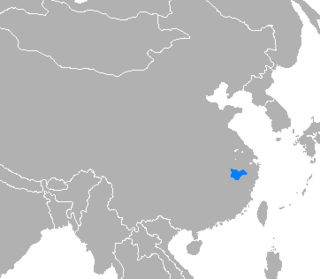
Huizhou Chinese, or the Hui dialect, is a group of closely related Sinitic languages spoken over a small area in and around the historical region of Huizhou, in about ten or so mountainous counties in southern Anhui, plus a few more in neighbouring Zhejiang and Jiangxi.
Lau Kar-leung, was a Chinese actor, filmmaker, choreographer, and martial artist from Hong Kong. Lau is best known for the films he made in the 1970s and 1980s for the Shaw Brothers Studio. His most famous works include The 36th Chamber of Shaolin starring Gordon Liu as well as Drunken Master II starring Jackie Chan.

Shek Wing-cheung, better known by his stage name Shih Kien, Sek Kin, or Sek Gin or Shek Kin(Chinese: 石堅; pinyin: Shí Jiān; Jyutping: Sek6 Gin1), was a Hong Kong–based Chinese actor and martial artist. Shih is best known for playing antagonists and villains in several early Hong Kong wuxia and martial arts films that dated back to the black-and-white period, and is most familiar to Western audiences for his portrayal of the primary villain, Han, in the 1973 martial arts film Enter the Dragon, which starred Bruce Lee.

Huaneng Power International, Inc. (HPI), commonly known as Huaneng Power, is a Chinese electric power company. It was established in 1994 by the China Huaneng Group, one of the five largest power producers in China. It engages in the development, construction and operation of large power plants.
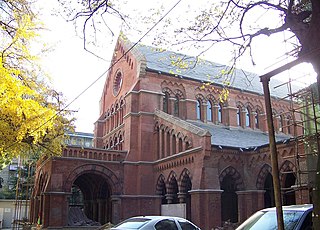
Chung Hua Sheng Kung Hui, known in English as the Holy Catholic Church in China or Anglican-Episcopal Province of China, was the Anglican Church in China from 1912 until about 1958, when it ceased operations.
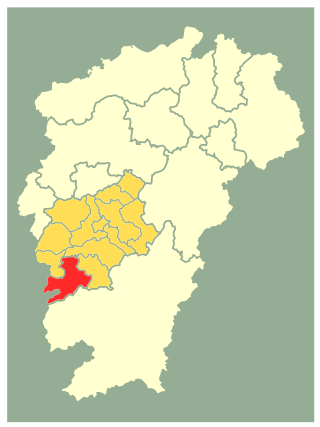
Suichuan County is a county in the southwest of Jiangxi province, People's Republic of China, bordering Hunan province to the southwest. It is under the jurisdiction of the prefecture-level city of Ji'an, and is its southernmost county-level division.
Unicorn Chan (1940–1987) was a Hong Kong actor, martial artist, stuntman and one of Bruce Lee's best friends since childhood. He acted in many films during childhood including The Birth of Mankind (1946) in which Bruce Lee starred. Unicorn Chan was erased from two Bruce Lee biopics which are Dragon: The Bruce Lee Story (1993) and The Legend of Bruce Lee (2008).
Wei Ping-ao, also known as Paul Wei, was a Hong Kong-based Chinese actor who started his career in the Shaw Brothers Studio. He is best known for playing cunning interpreters in Bruce Lee's 1972 films Fist of Fury and Way of the Dragon, in which he dubbed his own voice, and also appeared in films such as Deaf Mute Heroine (1971), Hapkido (1972) and Fists of Bruce Lee (1978). He suffered from jaundice in his later years. He died on 3 December 1989 in British Hong Kong.
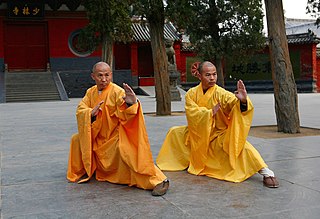
Wudang quan is a class of Chinese martial arts. In contemporary China, Chinese martial arts styles are generally classified into two major groups: Wudang (Wutang), named after the Wudang Mountains; and Shaolin, named after the Shaolin Monastery. Whereas Shaolin includes many martial art styles, Wudangquan includes only a few arts that use the focused mind to control the body. This typically encompasses taijiquan, xingyiquan and baguazhang, but must also include Baji chuan and Wudang Sword. Although the name Wudang simply distinguishes the skills, theories and applications of the internal arts from those of the Shaolin styles, it misleadingly suggests these arts originated at the Wudang Mountains. The name Wudang comes from a popular Chinese legend that incorrectly purports the genesis of taijiquan and Wudang Sword by an immortal, Taoist hermit named Zhang Sanfeng who lived in the monasteries of Wudang Mountain.
Hou Jingjing was the first Chinese woman in a wheelchair to earn a doctorate. She is currently employed at Nanjing Normal University.

Warrior is a brand of athletic shoe from China, founded in Shanghai in 1927. From the 60s to the early 80s it became a nationwide shoemaker in China.

Justice Bao is a Chinese TV series starring producer Jin Chao-chun as the Song dynasty official Bao Zheng. The series ran for 3 seasons from 2010 to 2012. In addition to Jin, Kenny Ho, Fan Hung-hsuan and Lung Lung again reprise their iconic roles from the 1993 Taiwanese hit Justice Pao and the 2008 Chinese series Justice Bao.
Kwan Shan was a Hong Kong film actor. Kwan appeared as a romantic lead actor in Mandarin-language films created in Hong Kong, especially during the 1960s. His roles included several Shaw Brothers Studio productions.

Guo Shengkun is a retired Chinese politician and business executive. He was the Secretary of the Central Political and Legal Affairs Commission of the Chinese Communist Party, a member of the CCP Politburo, and a secretary of the CCP Secretariat, between 2017 and 2022. Previously Guo served as Minister of Public Security, State Councilor, Communist Party secretary of Guangxi Zhuang Autonomous Region and General Manager of Aluminum Corporation of China, a major state-owned enterprise.

Liu-Wang Liming was a Chinese feminist, suffragette, and the publisher of the Women's Voice, a biweekly magazine. She organized the Zhan'en Institute for Refugee Children and the Chinese Women's Friendship Association. She was also principal of the West China Women's Vocational School.
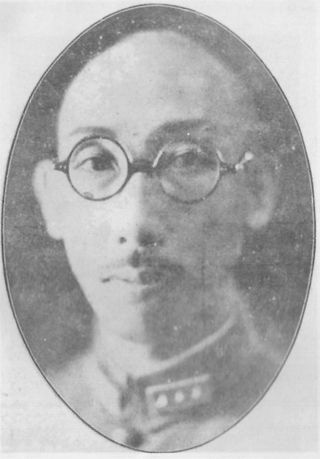
He Jian was a Chinese Nationalist (KMT) general and politician in the Republic of China. He was governor of Hunan province between 1929 and 1937, and Interior Minister from 1937 to 1939. He was best known for fighting the Communists, and he once ordered his subordinates to execute Yang Kaihui and Wu Ruolan.

The Legend of the Condor Heroes is a 2017 Chinese television series adapted from Louis Cha's novel of the same title and a remake of the 1983 Hong Kong television series based on the same novel. The series was directed by Jeffrey Chiang and starred Yang Xuwen, Li Yitong, Chen Xingxu and Meng Ziyi in the lead roles. It started airing on Dragon TV in mainland China on 9 January 2017, and on TVB Jade in Hong Kong on 8 May 2017.

Sun Yueh was a Taiwanese actor.















